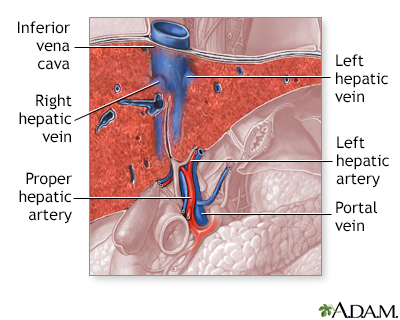Hepatic ischemia
Definition
Hepatic ischemia is a condition in which the liver does not get enough blood or oxygen. This causes injury to liver cells.
Alternative Names
Ischemic hepatitis; Shock liver
Causes
Low blood pressure from any condition can lead to hepatic ischemia. Such conditions may include:
- Abnormal heart rhythms
- Dehydration
- Heart failure
- Infection, especially sepsis
- Severe bleeding
Other causes may include:
- Blood clots in the main artery to the liver (hepatic artery) after a liver transplant
- Inflammation of blood vessels, leading to reduced blood flow (vasculitis)
- Burns
- Heat stroke
- Having a sickle cell crisis
Symptoms
The person may have altered mental status due to reduced blood flow to the brain. Other symptoms may include:
- Loss of appetite
- Feeling of general discomfort
- Jaundice
Damage to the liver cells most often does not cause symptoms until it affects liver function.
Blood clots in the liver's main artery may cause abdominal pain.
Exams and Tests
The following tests will be done:
Treatment
Treatment depends on the cause. Low blood pressure and blood clots must be treated right away.
Outlook (Prognosis)
People generally recover if the illness causing hepatic ischemia can be treated. Death from liver failure due to hepatic ischemia is very rare.
Possible Complications
Liver failure is a rare, but fatal complication.
When to Contact a Medical Professional
Contact your health care provider right away if you have persistent weakness or symptoms of shock or dehydration.
Prevention
Quickly treating the causes of low blood pressure may prevent hepatic ischemia.
Gallery

References
Korenblat KM, Berk PD. Approach to the patient with jaundice or abnormal liver tests. In: Goldman L, Schafer AI, eds. Goldman-Cecil Medicine. 26th ed. Philadelphia, PA: Elsevier; 2020:chap 138.
Nery FG, Valla DC. Vascular diseases of the liver. In: Feldman M, Friedman LS, Brandt LJ, eds. Sleisenger and Fordtran's Gastrointestinal and Liver Disease. 11th ed. Philadelphia, PA: Elsevier; 2021:chap 85.
Williams MJ, Gordon-Walker TT. Hepatology. In: Penman ID, Ralston SH, Strachan MWJ, Hobson RP, eds. Davidson's Principles and Practice of Medicine. 24th ed. Philadelphia, PA: Elsevier; 2023:chap 24.
